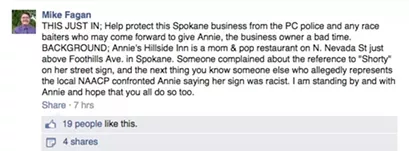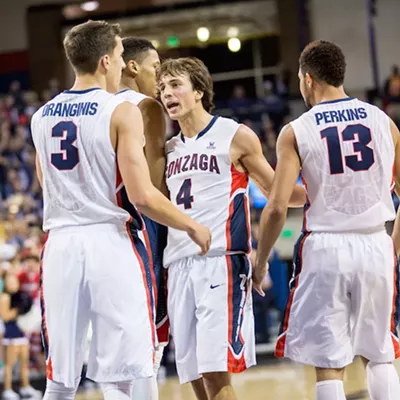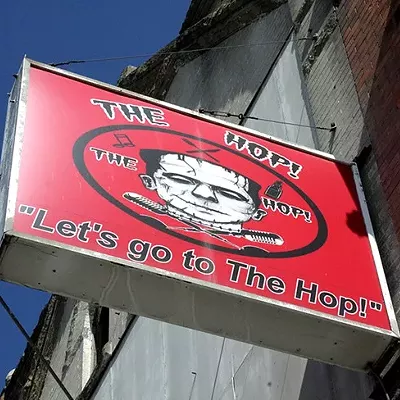Friday, January 16, 2015
Rachel Dolezal explains why "Shorty can't breathe either" is problematic
Newly elected Spokane NAACP President Rachel Dolezal was surprised yesterday when she received a phone call from a Spokesman-Review reporter, asking for her thoughts on a message posted on a sign outside a local diner: "Shorty can't breathe either."
The sign, erected in the parking lot of the Hillside Inn Restaurant, was inspired by the death of 88-year-old WWII veteran Delbert "Shorty" Belton. Dolezal, who's also an Inlander columnist, hadn't heard about it, so she thought she'd take a look for herself. Around 1 pm Thursday afternoon, after she got off work, Dolezal drove over to the Hillside Inn and asked to speak with the owner, Annie Pennington, about its phrasing.
In August 2013, Belton was beaten to death by two black teenagers. One of the suspects, Kenan Adams-Kinard, pleaded guilty to murder earlier this month. His accused accomplice, Demetrius Glenn, is scheduled to go to trial in March. Pennington, who used to serve Belton at the restaurant, told the Spokesman she changed the sign after Adams-Kinard pleaded guilty. "It’s nothing racial,” she said. “We did it in honor of Shorty because he’s a selfless, helpless old man, and if we don’t take care of our grandpas, no one will."
When approached by Dolezal, Pennington, Dolezal says, was "immediately defensive" and asked her to leave. According to the Spokesman, Pennington later called City Councilman Mike Fagan about complaints that the sign was "racist."
Now the controversy around the sign is playing out in the comments section of the Spokesman story and on Fagan's Facebook page, where he implicitly accuses Dolezal ("someone else who allegedly represents the local NAACP") of race-baiting and confronting Pennington. But that's not what happened, Dolezal says.
"I just wanted to go inside and have a conversation and see if we could discuss the implications of appropriating the Eric Garner quote," Dolezal told the Inlander. "It just seems like there’s some dissonance with understanding the context, and so I wanted to invite a conversation and see if we could reach some understanding of it."
Garner, a black man, was killed in Staten Island last July from a police officer's chokehold. As he was restrained and wrestled to the ground by multiple officers, he repeated the words "I can't breathe" eight times before losing consciousness. After a New York grand jury declined to bring charges against the officer who killed him, Garner's words have become a rallying cry for protesters around the country in demonstrations against unprosecuted police killings of unarmed black men and boys, like Michael Brown, John Crawford and Tamir Rice.
"If there's an analogy being made, I think it’s a bit bizarre," Dolezal says, "to draw that parallel with a movement that’s about people being murdered and those murders not being brought to justice at all, versus a case where there's probable cause and no proof of murder — and it certainly wasn't videotaped — yet there has been every effort to penalize the two teenagers."
"I can't breathe," Dolezal says, is also a "metaphor for that larger deficit of racial and social justice."
Long before Eric Garner and Michael Brown's deaths, Frantz Fanon, a Mozambique-born philosopher and anti-colonial revolutionary said, "We revolt simply because, for many reasons, we can no longer breathe."
"The strangling of Eric Garner's case reminds us of our cultural memory of the strangling through the nooses," she says. "That's the context for that statement.
"There's still loss on all sides," she continues. "The sign is alienating and pushes back on an aspect of the community that is also hurting and in pain right now."
Tags: eric garner , micheal brown , ferguson , delbert belton , shorty belton , rachel dolezal , News , Image






















